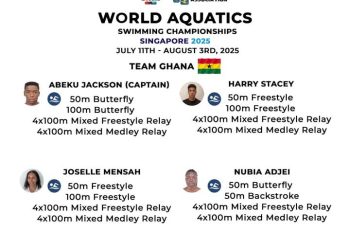Ghana is betting on its revamped national identification system to finally tackle the scourge of age fraud in football, a long-standing crisis that has tarnished the reputations of African teams and led to high-profile disqualifications.
The National Identification Authority (NIA) has rolled out initiatives to register minors and newborns, creating a centralized database to verify ages—a move hailed as critical for restoring integrity in youth sports. Yet experts caution that technical glitches, lax enforcement, and systemic loopholes could undermine progress.
Age cheating, a persistent issue across sub-Saharan Africa, has seen Ghana and peers like Nigeria and Cameroon face humiliating sanctions. In 2023 alone, MRI scans disqualified 57 players from Cameroon and DR Congo ahead of the U-17 Africa Cup of Nations. Ghana’s own youth teams, despite historic successes—including two U-17 World Cup titles—have faced skepticism over whether victories were earned fairly. “These scandals aren’t just about trophies; they erode trust in African football’s future,” said Alfred Christ Agidi, a youth academy director.
The NIA’s dual registration drives—targeting children aged 6–14 and infants from birth—aim to close gaps exploited by fraudsters. Previously, Ghanaians only received national IDs at 15, allowing families to falsify birthdates during enrollment. The new system links infant records to their mothers until age six, though no physical card is issued. NIA Executive Secretary Wisdom Kwaku Deku acknowledged teething problems: “Network failures, duplicate entries, and poor photo capture by health workers are slowing rollout,” he admitted.
While the initiative has drawn praise, critics argue it’s only half the battle. Agidi rates the system’s effectiveness at 6/10, stressing that without integration with sports bodies like the Ghana Football Association (GFA), the ID remains “a tool without a mission.” He urges the GFA to adopt real-time age verification using the NIA database and impose harsh penalties—fines, suspensions, lifetime bans—on clubs and academies caught fielding overage players.
FIFA’s introduction of wrist MRI scans in 2009 temporarily curbed fraud but failed to address root causes: poverty-driven desperation and spotty birth registrations. Ghana’s approach, part of a broader digital public infrastructure (DPI) overhaul, could set a continental precedent if paired with enforcement. “A national ID isn’t magic,” warned Accra-based sports analyst Efua Mensah. “Without audits and accountability, we’ll just digitize the same old lies.”
The stakes are high. Beyond reputational damage, age fraud distorts talent development, pushing physically mature players into youth leagues where they dominate but rarely transition successfully to senior teams. Ghana’s 2010 World Cup quarterfinal run remains Africa’s pinnacle—a stark contrast to its youth accolades.
As the NIA races to fix registration gaps, collaboration with hospitals, schools, and sports leagues will be pivotal. For now, the dream of ending age fraud hinges on something simpler: a culture shift where integrity outweighs the allure of shortcuts. “This isn’t just about football,” Agidi said. “It’s about proving Africa can compete fairly—and win.”
- President Commissions 36.5 Million Dollars Hospital In The Tain District
- You Will Not Go Free For Killing An Hard Working MP – Akufo-Addo To MP’s Killer
- I Will Lead You To Victory – Ato Forson Assures NDC Supporters
Visit Our Social Media for More





